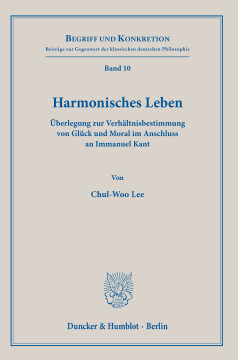Harmonisches Leben

BOOK
Cite BOOK
Style
Format
Harmonisches Leben
Überlegung zur Verhältnisbestimmung von Glück und Moral im Anschluss an Immanuel Kant
Begriff und Konkretion, Vol. 10
(2023)
Additional Information
Book Details
About The Author
Chul-Woo Lee lehrt an der Sejong Universität in Seoul, Südkorea, Philosophie mit Schwerpunkt auf Ethik, politischer Philosophie und Religionsphilosophie. Er promovierte an der Eberhard-Karls-Universität Tübingen bei Herrn Prof. Dr. Dr. h.c. mult. Otfried Höffe. Er ist derzeit Forschungsdirektor der Koreanischen Kant-Gesellschaft (Südkorea). Im Mai 2025 erhielt er den Wissenschaftspreis einer koreanischen philosophischen Gesellschaft für seinen Aufsatz »Für eine Theorie des autonomen Glücks – Gegenwart und Zukunft der kantischen Ethik«.Abstract
Die Arbeit untersucht systematisch die ethische Verhältnisbestimmung von Glück und Moral im Anschluss an Kants autonomes Moralsystem. Hierbei thematisiert die Arbeit nicht die begründungs- und motivationstheoretische Bedeutung des Glücks für die Moral, sondern erweist den handlungstheoretisch-existentiellen Sinn der Moral für das Glück als gutes Leben. Die Untersuchung erhellt somit die aktuelle ethische Relevanz der kantischen autonomen Moral für das Glück als gutes Leben, welches das allerletzte Handlungsziel des menschlichen Daseins ist. Die These der Arbeit lautet, dass Kant im Unterschied zur Unvereinbarkeitsthese, Dissonanzthese und Koinzidenzthese des Verhältnisses von Glück und Moral eine dissonante Harmoniethese vertritt als plausibelste Antwort auf die fundamentalethische Grundfrage, ob und inwiefern die Moral zum Glück führen kann.»Harmonious Life. Reflection on Determining the Relationship between Happiness and Morality in Connection to Immanuel Kant«: The study investigates the ethical relationship between happiness and morality in Kant, and argues for the following claim: While rejecting an Incompatibility-Thesis, a Dissonance-Thesis and a Coincidence-Thesis Kant defends a dissonant Harmony-Thesis as the most plausible answer to the fundamental ethical question whether and to what extent morality can lead us to happiness. It thus updates the ethical relevance of Kant's autonomous morality for happiness as a good life.
